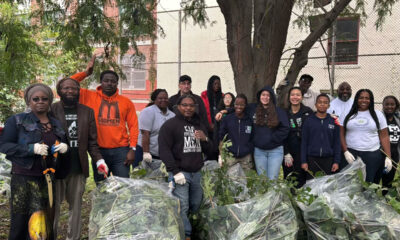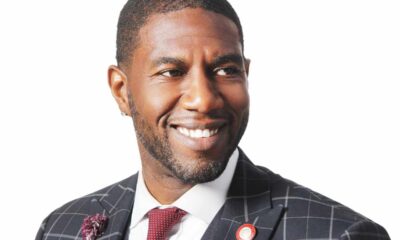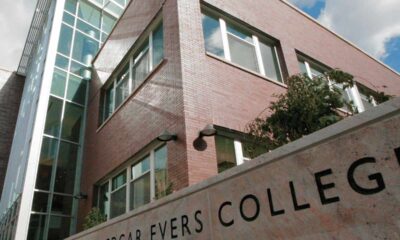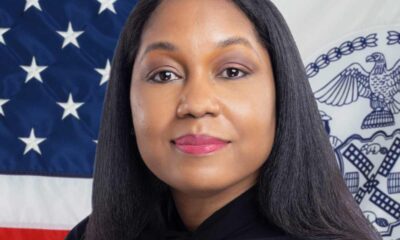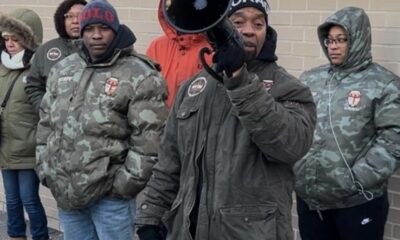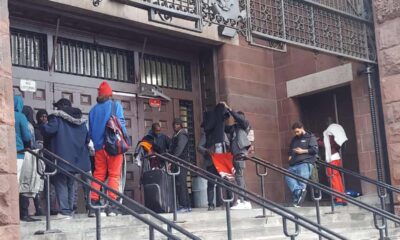Community News
Brooklyn Movement Center Holds 2016 Annual Meeting
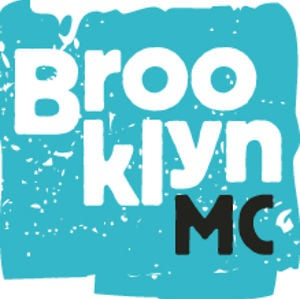
REVISED
By Akosua K. Albritton
Brooklyn Movement Center (Brooklyn MC) held its 5th annual meeting on October 1, 2016 in Stuyvesant Mansion at 375 Stuyvesant Avenue. Attendees included board members, their core members, solidarity members and the curious. Notable guests included Stefani Zinerman of CM Robert Cornegy’s office, NYS Assembly member-elect Tremaine Wright and The Brooklyn Reader Publisher Zawadi Morris.
Lead organizer Anthonine Pierre made the opening greetings and primed the body for thought-provoking discussions by posing the questions: 1) How does Brooklyn MC activists make themselves sustainable beyond their first five years of existence? 2) What does it look like to do Black Lives advocacy? And 3) What is the role of Black elected officials in this work? Community organizer-turned-City Council member Jumaane Williams gave an engaging keynote speech that responded to the third question.
Dressed in a pullover sweater and slacks, Williams spoke frankly about race relations, power structures and the power that’s generated by community-driven social justice campaigns. He quipped, “Central Brooklyn really means Black Brooklyn”. Williams explained, “There is a structure now where some people benefit and others don’t. Black Lives advocacy is difficult due to the people being addressed”. Williams went on to say, “The difficulty in organizing around Black issues is that many people don’t want to deal with the conditions of Black people. It is okay to organize around women’s issues but Black has a difficult path. Then there is the fact that leadership in some organizations don’t have Black leadership. Take Flatbush Development Corp. and Tenants and Neighbors as examples”.
Williams asserted that “public safety can’t be left up to the police”. It should also include housing, education and employment. Further, he contended that “Stop, Question and Frisk could be a useful tool; however, it is overabused due to bias-based policing”. The bias is in the preponderant stopping of men of color and the tactic is used to meet quotas rather than observing questionable activity by anyone and then implementing all the steps in Stop, Question and Frisk.
After three icebreaking questions were bandied, the meeting moved to describing Brooklyn MC’s work groups which are Police Accountability, Food Justice, Environmental Justice, Street Harassment and Brooklyn DEEP.
Peter Velez explained the Police Accountability Work Group focused on Central Brooklyn. Velez said that “Social Media and cell phones give people a longer view of the abuse waged on Black and Brown bodies”. Current initiatives are the Right to Know Act, business cards for police officers and Consent to Search. This work group coalesces with Communities for Police Reform, which is a citywide coalition.
Sabine Bernard and Ogonnaya Dotson-Newman presented the Street Harassment Work Group. Street Harassment works on measures to reduce verbal and physical assaults on women, queer folks and gender nonconforming individuals. The No Disrespect Project focuses on the harassment and objectification of women by men while in public spaces.
Sala Hewitt discussed the aim of the Food Justice Work Group which deals with “providing access to affordable and quality food choices to the local area”. The work group has been engaged in incubating and incorporating the Central Brooklyn Food Cooperative. The food cooperative currently operates from the Brooklyn Movement Center.
Veralyn Williams described Brooklyn MC’s Brooklyn DEEP podcast. Ms. Williams said, “Brooklyn DEEP is a platform for people to be the owners and tellers of their own stories”. Williams envisioned Brooklyn DEEP becoming “the APP for Central Brooklyn”. In recognition of Veralyn Williams’ departure from Brooklyn MC, Executive Director Mark Winston Griffith surprised her with a flower bouquet.
Griffith transitioned to discussing the Environmental Justice Work Group which is the newest area of work. This work group has two projects: Central Brooklyn Solar and BASE. Central Brooklyn Solar is an effort to increase the installation of solar panels throughout Central Brooklyn. Brooklyn MC received a $5,000 seed grant from NYSERDA to organize Central Brooklyn Solar.
BASE is the acronym for Brooklyn Alliance for Sustainable Energy. This project is in keeping with Consolidated Edison’s mandate to bring down energy consumption. The BASE coalition seeks to have a new substation constructed in Brooklyn in order that increasing energy demands are fulfilled.
The annual meeting closed with a practical discussion on sustaining the organization in terms of people and finances. Griffith explained the membership needed to increase in number and where everyone is paying dues. Further, members require training to do effective outreach about the group’s causes and to bring more people into the fold. To increase funding, the board of directors and members are put to task to execute more effective fundraising.
This annual meeting was a strategic planning session that gave attendees the means to address such issues as balancing the power between the public and the police, the right of women to be in public spaces, siting clean energy in communities of color and making available affordable, nutrient-dense food. With effective and consistent public outreach, the Brooklyn Movement Center may positively impact lives through collective work and responsibility.



